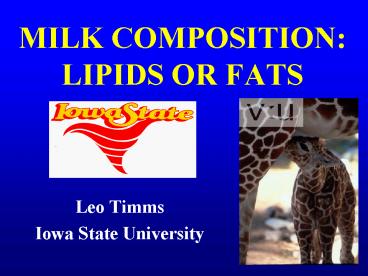MILK COMPOSITION: LIPIDS OR FATS - PowerPoint PPT Presentation
1 / 24
Title:
MILK COMPOSITION: LIPIDS OR FATS
Description:
2.25x as much E as glucose. Provide insulation. Maintain body ... variability in fatty acid profiles (handout) Fatty acid content is labile: diet changes ... – PowerPoint PPT presentation
Number of Views:397
Avg rating:3.0/5.0
Title: MILK COMPOSITION: LIPIDS OR FATS
1
MILK COMPOSITIONLIPIDS OR FATS
- Leo Timms
- Iowa State University
2
Why is fat important?
- Concentrated source of energy
- 2.25x as much E as glucose
- Provide insulation
- Maintain body temperature
- Protect vital organs
- Membrane synthesis
- Vitamin transport
- MANY MORE!!!
3
MILK COMPOSITION
LIPIDS OR FATS
- Mostly triglycerides
- most variable component!!!
- - across and within species!
- lt1 - gt50 fat species differences
- variability in fatty acid profiles (handout)
- Fatty acid content is labile diet changes
- major TASTE component in milk
4
LIPIDS OR FATS
. Wt of
lipids . Lipid Cow
Human Rat Triglyceride 97-98
98.2 87.5 Diglyceride .25-.48
.7 2.9 Monoglyceride .02-.04
T 0.4 Free fatty acids .1-.4
.4 3.1 Phospholipids .6
1 .25 0.7 Cholesterol
.2 - .4 .25 1.6
5
Triglyceride
Glycerol 3 Fatty Acids Triglyceride Connected
by an ester bond Fatty acids can be the same or
mixed
6
FATTY ACIDS
- Long chain gt C14 (14 carbons)
- - diet - adipose
- Medium chain C10-C14 (10-14 carbons)
- Short chain lt C8 (lt 8 carbons)
- made in the mammary gland
- - glucose (NR) - acetate/butyrate (rum)
- Saturated no double bonds
- Unsaturated double bonds
7
LIPIDS OR FATS
8
LIPIDS OR FATS
Where do milkfat precursors come from?
- 1. Blood lipids long chains
- diet and adipose tissue
- lipoproteins (liver)
- chylomicrons (gut)
- free fatty acids / ketones
- 2. Glucose glycerol
- fatty acids (non ruminants)
- 3. Acetate and butyrate (ruminants)
9
LIPIDS OR FATS
10
FATTY ACIDS
- Long chain gt C14 (14 carbons)
- - diet - adipose
- Medium chain C10-C14 (10-14 carbons)
- Short chain lt C8 (lt 8 carbons)
- made in the mammary gland
- - glucose (NR) - acetate/butyrate (rum)
- Saturated no double bonds
- Unsaturated double bonds
11
FATTY ACIDS
- What do the fatty acids of triglycerides look
like that get to the mammary gland?
- long chain fatty acids (diet / adipose)
- diet mammary gland (non-ruminants)
- diet is different than mammary gland in
ruminants - Polyunsaturated fatty acids from feeds are
hydrogenated (saturated) in rumen - Rumen by pass fats mammary gland!
12
LIPIDS OR FATS
13
GETTING FATS INTO THE GLAND
- 35-50 of triglycerides (chylomicrons/
lipoproteins taken up by mammary gland) - Triglycerides must be broken down to get into
mammary gland. - Lipoprotein lipase capillary walls
- 17 -45 of milk fat from acetate
- 8 - 22 of milk fat from butyrate
- Ruminants 50 diet / 50 de novo syn.
- Acetate/ butyrate / ketones in milk (diag.)
14
Lipoprotein lipase (LPL)
- Anchored to capillary walls
- Hydrolyses triglycerides
- 1-3 times
- All cells have equal access to free FAs
- Therefore must circulate in blood as
triglycerides - Tissues with higher LPL activity can uptake more
fat from blood
15
Free fatty acids
16
MILK FATTY ACIDS - COW
from de novo from
VLDL Fatty acid synthesis fatty
acids C4 - C10 100
0 C12 80 - 90
10 - 20 C14 30 - 40
60 - 70 C16 20 - 30
70 - 80 C18
0 100
17
DE NOVO FATTY ACID SYNTHESIS IN THE MAMMARY GLAND
- Occurs in the cytoplasm!
- Need a few things
- short carbon chains ( acetyl - CoA)
- - acetate and butyrate ( ruminants)
- - glucose (acetate) in non ruminants
- reducing equivalents ( NADPH2)
- proper enzymes
- Acetyl CoA carboxylase / fatty acid synthetase
18
DE NOVO FATTY ACID SYNTHESIS IN THE MAMMARY GLAND
- Acetyl CoA (2C) HCO3 ATP
- Malonyl CoA (3C) ADP P H
- (acetyl CoA carboxylase - rate limiting)
- Acetyl ACP (2 C) Malonyl ACP (3C)
- next 4 steps - fatty acid synthetase
- Large single cpmplex of enzymes
19
(No Transcript)
20
(No Transcript)
21
DE NOVO FATTY ACID SYNTHESIS IN THE MAMMARY GLAND
- Acetyl ACP (2 C) Malonyl ACP (3C)
- condensation ACP
CO - reduction
NADPH - NADP - dehydration
H2O - reduction NADPH
- NADP - 4 carbon chain (Butyrate)
- Add 2 carbons at 1 time C2 C3 C4 CO2
- Lots of energy 1 ATP and 2 NADPH / 2 carbons
- fatty acid chain attached to acyl carrier protein
22
MILK FATTY ACIDS
C40 Butyric acid C160 Palmitic acid C60
Hexanoic C180 Stearic C80 Caprylic
C181 Oleic C100 Caproic C182
Lineoleic (ess.!) C120 Auric C183
Linolenic (ess.) C140 Myristic
- Most species lots of palmitate / oleic
- More short chains in ruminants
- Conjugated linoleic acid (CLA)
- Other species diff goats C8 C10
23
MILK TRIGLYCERIDE SYNTHESIS
- Occurs at cytoplasmic surface of smooth
endoplasmic reticulum - Glycerol fatty acids (esterified)
- Esterases (enzymes)
- Fatty acid specificity to C site
- Fatty acids coalesce to form droplets
- Grow and move to apical membrane
- Secreted with membrane (protein coating)
24
MILK COMPOSITION
Apical membrane
Basement membrane

